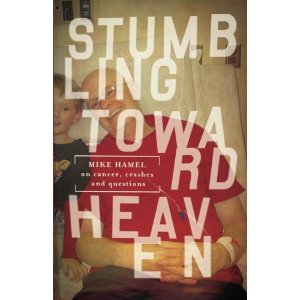An Interview With Mike Hamel – Author of Stumbling Toward Heaven
Note From Bill Dahl:
I REALLY enjoyed Mike’s book. You will too. You DON’T have to be a cancer patient to appreciate this book.
I asked Mike to “interview himself.” So here it is:
An Interview with Mike Hamel, author of:
How many people are affected by cancer?
»» About 28,000,000 people in the world today have cancer.
»» Cancer will affect one person in three before age seventy-five.
»» Cancer and its complications will kill one in four people in the Western world.
»» Cancer causes twelve percent of all deaths on Earth = 7 million annually.
»» Ten million North Americans have cancer; 600,000 will die from it this year.
»» There are 10 million new cases of cancer worldwide annually.
Everyone knows someone who has cancer or another deadly disease. And for every cancer sufferer there is a network of caregivers whose lives are profoundly changed.
What was it like to learn you had a potentially terminal disease?
Life is a terminal disease. Still, it’s a shock to wake up one day and find yourself in the Express Lane. When I learned I had non-Hodgkin lymphoma I did what everyone else does who hears their name and “cancer” in the same sentence. I asked the doctor, “how long do I have?” Then I went online looking for a survival graph for my type of cancer. I researched “median” survival rates and “overall survivability.”
Having a number put on the right side of your lifeline gives new meaning to the cliché “your days are numbered.” It reduces life to the essentials, which for me come down to:
»» meaningful relationships – people matter more than possessions.
»» wonderful memories – building on significant events.
»» acquired wisdom – what I’ve learned that’s worth passing on.
Why do you think an all-loving God allows cancer and other deadly diseases?
The short answer is that according to the Bible, sin and suffering entered the world through the disobedience of Adam and Eve and spread to all humanity. But for me, this raises more questions.
Thinking about human pain and suffering is like trying to ride a bull. Most efforts are short-lived and you can get the faith kicked out of you. I’ve wrestled with the antinomy of a good God and a bad world for most of my life. I’ve had insights that have caused me to reject certain explanations but I still fall far short of understanding why things have to be the way they are, even given free will and human sinfulness.
Why include your spiritual struggles in a book about cancer? People facing death need encouragement, not doubt.
In the past I mostly kept my spiritual questions to myself. When I decided to write about my cancer I resolved to be completely candid. Autobiographies that leave out the messy stuff strike me as disingenuous. We can’t separate the body from the soul. What happens to one deeply affects the other. Physical trials raise spiritual questions. I have chosen to admit and share mine because I believe this will be more helpful than harmful in the end.
Many people have agonized through the “dark night of the soul” and we draw encouragement from their transparent writings. Not all waited to voice their confusion and concerns until they could do so in the past tense. Neither must we.
It’s been three years since your diagnosis and two years since your bone marrow transplant. Do you feel like you’ve beaten cancer?
Not at all. After my first chemo regimen I had three clear PET scans. I got a cancer survivor certificate from my oncologist, a party from my family, and the obligatory T-shirt. But a few months later the lymphoma returned. Overall Survivability (OS) is measured at five years. I have two years to go to reach that mark.
Cancer casts a long shadow. It puts life in perspective and helps me savor the mundane and be more present in the moment. It makes me more thankful for the gifts bestowed by everyday providence.
What advice would you give someone who has just been diagnosed with cancer?
Take charge of your own care. Adopt the attitude of a client, not a patient. By definition, a patient is “one who receives medical attention or treatment.” A client on the other hand is “the party for whom professional services are rendered.” Here’s the difference:
»» A patient is the object of medical care; a client is the subject of medical services. In language as in life, an object is passive, a subject is active.
»» A patient complies with the experts. A client consults the experts, then follows what seems the best advice.
»» A patient might complain but would never contradict an authority. A client will ask questions and weigh alternatives before deciding.
»» A patient goes where sent and doesn’t change doctors or clinics. A client tries to find the best physicians and facilities realistically available.
Being a client takes a lot more work. The goal is not to become your own oncologist, it is to better understand your cancer so you can be proactive in dealing with it. After all, it’s your life that’s a stake.
And remember the words of John Diamond, “Cancer is a word, not a sentence.”



